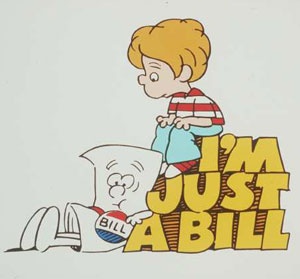
 The Songwriters’ Equity Act was introduced yesterday (Feb. 25) and aims to put mechanical and performance royalty rates in line with fair market rates. The SEA would update sections 114 and 115 of the Copyright Act. (See a one-sheet on the bill.)
The Songwriters’ Equity Act was introduced yesterday (Feb. 25) and aims to put mechanical and performance royalty rates in line with fair market rates. The SEA would update sections 114 and 115 of the Copyright Act. (See a one-sheet on the bill.)
Georgia Congressman Doug Collins introduced the legislation.
According to the National Music Publishers’ Association (see video here), a WW1-era law results in mechanical royalties on an iTunes download being paid 90 percent to record labels and 10 percent to songwriters and publishers. For performance royalties, labels are paid anywhere between 10 to 14 times more than publishers and writers. Synch royalties are split 50/50.
NMPA President and CEO David Israelite explained:
“The Songwriter Equity Act represents an important step to inject fairness into a process that is undeniably stacked against songwriters and publishers, and I applaud Congressman Collins for his leadership on the issue.
Roughly two-thirds of a songwriter’s income is heavily regulated by law or through outdated government oversight. This results in devalued intellectual property rights. This legislation addresses two significant inequities under current copyright law that prevent songwriters and music publishers from receiving compensation that reflects the fair market value of their work.
Created before the existence of recorded music to regulate piano rolls for player pianos, Section 115 of the Copyright Act is shorthand for a complex compulsory license system that dates back to 1909. This system effectively prohibits songwriters and music publishers from negotiating for the use of their songs, forcing well-below market rates instead of fair value.
In 1909, Congress set a rate of 2 cents per copy. Today, more than 100 years later, that rate has increased to only 9.1 cents. The incremental increase is a result of the Copyright Royalty Board, or CRB, legal obligation to apply a below-market standard when determining mechanical royalties for songwriters and music publishers.
Section 114(i) was enacted by Congress to protect songwriters and ensure that their compensation was not unfairly diminished. But the effect of the provision has, in fact, been the exact opposite. This legislation would help restore what Congress originally intended – fair compensation for the public performance of a songwriter’s work. it allows the federal rate court to consider rates paid to recording artists for the performance of sound recordings over digital platforms – evidence that the court is currently prohibited by law from considering. I fear that without the Songwriter Equity Act, songwriting as a profession will give to way songwriting as a hobby, and an important American treasure will be in jeopardy.”
Commenting on the SEA, BMI Chief Executive Officer Michael O’Neill said:
“This bill is an important step on the road to fairness for the more than 600,000 songwriters and music publishers represented by BMI.
The current environment, where performances of sound recordings are valued at 12 times those of the musical compositions that underlie them, is untenable. Similarly, the rates set for making copies of musical works under Section 115 are artificially depressed and lack a relationship to the marketplace. We are simply asking Congress to take the evidentiary blinders off of the judges who control a significant portion of our writers’ income from public performance and mechanical royalties.
We are grateful to Congressman Collins for his leadership on this important issue and for his support in co-sponsoring this important bill. We look forward to working with Congress to find an equitable solution.”
ASCAP Pres. and chairman Paul Williams said:
“The Songwriter Equity Act is an important first step toward a more effective and efficient licensing system that will benefit everyone – consumers, music licensees and the songwriters and composers who are the foundation of the rapidly changing music environment. I commend Congressman Doug Collins for his vision and efforts on this issue.
For more than 100 years, ASCAP has proudly provided music users with blanket licenses at reasonable rates, while ensuring the nearly 500,000 small and independent songwriters, composers and music publishers we represent are fairly compensated for their creative work. But while technology is creating amazing opportunities for music to reach new audiences, it’s also creating real challenges for songwriters and other creators when it comes to licensing our work, because the rules that govern how we do business haven’t kept pace.
By updating the outdated provisions of the Copyright Act in Sections 114(i) and 115, Congress has an opportunity to modernize the music licensing system so that songwriters and composers can thrive alongside the businesses that use our music.”

Category: Featured
About the Author
Sarah Skates has worked in the music business for more than a decade and is a longtime contributor to MusicRow.View Author Profile


